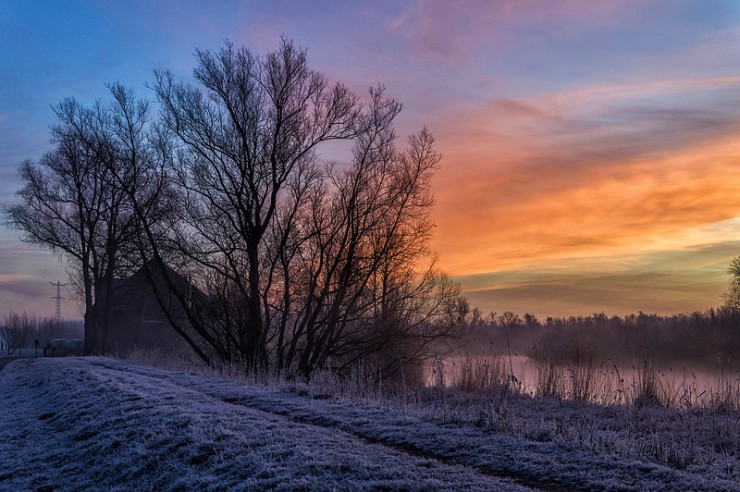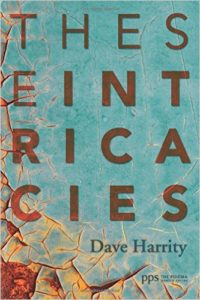It’s surprising at times how reading a collection of poems, or even one poem or its title, will take you on a search for understanding that brings you back to where you began. That’s what happened with These Intricacies by Dave Harrity.
With me, it was the title that first captured my attention. The collection contains no title poem. The title does come from a poem, Blood From the Stone by George Oppen (1908-1984), the leading proponent of the Objectivist school of poetry, popular in the 1920s and 1930s. Objectivism “emphasized simplicity and clarity over formal structure and rhyme, ” according to the Poetry Foundation.
Both a poet and editor, Oppen worked with Ezra Pound and William Carlos Williams, among others. In the 1950s, he was caught up in the Red Scare of the 1950s (he had been a member of the communist party), and fled to Mexico rather than go to prison. When he returned, “Blood from the Stone” was the first poem he wrote.When he returned, “Blood from the Stone” was the first poem he wrote. A line from it refers to a city’s “intricacies, ” which Harrity used in the title of his own collection of poems.
The title is a kind of homage, for Harrity’s poems are all about simplicity and clarity, planted firmly in the landscape of Kentucky, Harrity’s home. The collection includes 34 poems and the nine numbered poems are grouped together as “Novena.”
You read a collection like These Intricacies, and you soon find yourself forgetting structure and rhyme, and instead becoming absorbed in simple, clear stories like this one:
I found a cassette with you voice singing.
The wheels of the tape turned away from time
to let me hear your rendition of Folsom Prison Blues.
When I was a boy, I sat on your lap and you taught
me those words—the song of a lonely prisoner staring
from his cell window at the miles of rail that ran
the train past the jail. When I was a boy, the dollar bill
woven in your strings was a rattling snare of steam.
When I was a boy, your voice was the wheel grinding
the track, rolling through California. But now
you sing to me and I’m the prisoner listening
to a whistle blow the warm swell of being free.
I’m watching the train’s slow escape, soot billow
falling to earth as a frown of black cloud.
The poems tell stories about Ground Zero in Manhattan, a slave wall in Kentucky, the space shuttle disaster, a cemetery, the stars, loving your neighbor, and more. Quiet meditations all, they take what seems simple—like a cassette of a grandfather singing—and discover depths in the simplicity.
And they explore faith. The nine numbered poems grouped together as “Novena” form a kind of offering; one can imagine reading these poems aloud as candles burn in memory, in supplication, and in thanksgiving.
The final section of the collection includes poems about prayer, confession, the natural order and other themes, but not in a direct way. Instead, Harrity filters these ideas through the lens of common experiences, suggesting that the sacred is indeed wrapped in the fiber of the everyday. (My favorite poem title in this section is “Hallelujah I’m a Bum.”)
Harrity is an assistant professor English at Campbellsville University and lives in Louisville, Kentucky, with his family. He is the author of Making Manifest: On Faith, Creativity, and the Kingdom at Hand, These Intricacies: Poems, and Our Father in the Year of the Wolf: Poems, forthcoming in 2016 from Word Farm Press.
These Intricacies is a thing of simplicity, and beauty.
Related:
Dave Harrity, in a 2012 article here at Tweetspeak Poetry, on his journey into poetry.
My review of Harrity’s Making Manifest: On Faith, Creativity, and the Kingdom at Hand.
Harrity on faith and creativity, Part 1 and Part 2.
Photo by Paul van de Velde, Creative Commons, via Flickr. Post by Glynn Young, author of the novels Dancing Priest and A Light Shining, and Poetry at Work.
__________________________

“I require all our incoming poetry students—in the MFA I direct—to buy and read this book.”
—Jeanetta Calhoun Mish
- “Your Accent! You Can’t Be from New Orleans!” - October 9, 2025
- Poets and Poems: Donna Vorreyer and “Unrivered” - October 7, 2025
- Poet Sidney Lanier and the Lost Cause - October 2, 2025



HisFireFly says
Would love to read this — perhaps it will show up as a Christmas gift
Bethany R. says
Thank you for reviewing this collection and sharing, “My Grandfather Sings Again.” After I read the poem, I sat in my kitchen chair for awhile–let it settle in me. My eyes are wet, and I want to read more.
Glynn says
It’s a beautiful poem, Bethany. Thanks for reading and the comment.